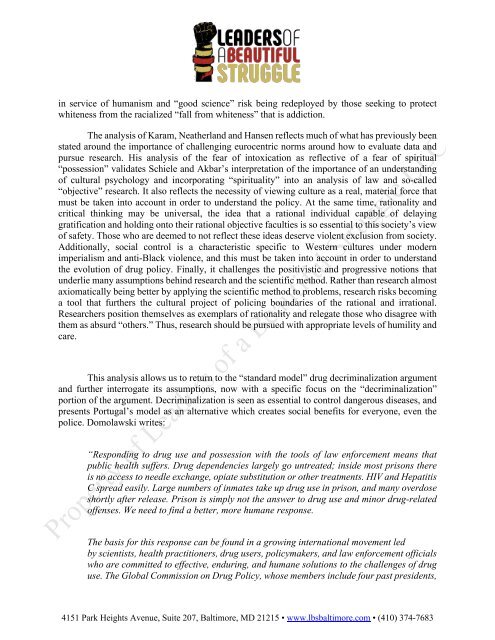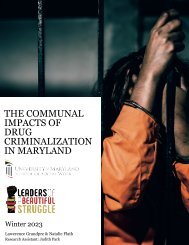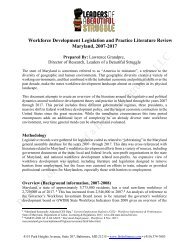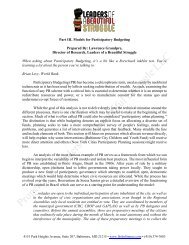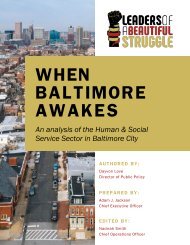Drug Decriminalization in Maryland Through an African Centered Research Paradigm- Analysis and Recommendations
This document offers guidance for theorizing questions related to a proposed research project purposed to advance drug decriminalization in Maryland.
This document offers guidance for theorizing questions related to a proposed research project purposed to advance drug decriminalization in Maryland.
- No tags were found...
You also want an ePaper? Increase the reach of your titles
YUMPU automatically turns print PDFs into web optimized ePapers that Google loves.
<strong>in</strong> service of hum<strong>an</strong>ism <strong>an</strong>d “good science” risk be<strong>in</strong>g redeployed by those seek<strong>in</strong>g to protect<br />
whiteness from the racialized “fall from whiteness” that is addiction.<br />
The <strong>an</strong>alysis of Karam, Neatherl<strong>an</strong>d <strong>an</strong>d H<strong>an</strong>sen reflects much of what has previously been<br />
stated around the import<strong>an</strong>ce of challeng<strong>in</strong>g eurocentric norms around how to evaluate data <strong>an</strong>d<br />
pursue research. His <strong>an</strong>alysis of the fear of <strong>in</strong>toxication as reflective of a fear of spiritual<br />
“possession” validates Schiele <strong>an</strong>d Akbar’s <strong>in</strong>terpretation of the import<strong>an</strong>ce of <strong>an</strong> underst<strong>an</strong>d<strong>in</strong>g<br />
of cultural psychology <strong>an</strong>d <strong>in</strong>corporat<strong>in</strong>g “spirituality” <strong>in</strong>to <strong>an</strong> <strong>an</strong>alysis of law <strong>an</strong>d so-called<br />
“objective” research. It also reflects the necessity of view<strong>in</strong>g culture as a real, material force that<br />
must be taken <strong>in</strong>to account <strong>in</strong> order to underst<strong>an</strong>d the policy. At the same time, rationality <strong>an</strong>d<br />
critical th<strong>in</strong>k<strong>in</strong>g may be universal, the idea that a rational <strong>in</strong>dividual capable of delay<strong>in</strong>g<br />
gratification <strong>an</strong>d hold<strong>in</strong>g onto their rational objective faculties is so essential to this society’s view<br />
of safety. Those who are deemed to not reflect these ideas deserve violent exclusion from society.<br />
Additionally, social control is a characteristic specific to Western cultures under modern<br />
imperialism <strong>an</strong>d <strong>an</strong>ti-Black violence, <strong>an</strong>d this must be taken <strong>in</strong>to account <strong>in</strong> order to underst<strong>an</strong>d<br />
the evolution of drug policy. F<strong>in</strong>ally, it challenges the positivistic <strong>an</strong>d progressive notions that<br />
underlie m<strong>an</strong>y assumptions beh<strong>in</strong>d research <strong>an</strong>d the scientific method. Rather th<strong>an</strong> research almost<br />
axiomatically be<strong>in</strong>g better by apply<strong>in</strong>g the scientific method to problems, research risks becom<strong>in</strong>g<br />
a tool that furthers the cultural project of polic<strong>in</strong>g boundaries of the rational <strong>an</strong>d irrational.<br />
<strong>Research</strong>ers position themselves as exemplars of rationality <strong>an</strong>d relegate those who disagree with<br />
them as absurd “others.” Thus, research should be pursued with appropriate levels of humility <strong>an</strong>d<br />
care.<br />
This <strong>an</strong>alysis allows us to return to the “st<strong>an</strong>dard model” drug decrim<strong>in</strong>alization argument<br />
<strong>an</strong>d further <strong>in</strong>terrogate its assumptions, now with a specific focus on the “decrim<strong>in</strong>alization”<br />
portion of the argument. <strong>Decrim<strong>in</strong>alization</strong> is seen as essential to control d<strong>an</strong>gerous diseases, <strong>an</strong>d<br />
presents Portugal’s model as <strong>an</strong> alternative which creates social benefits for everyone, even the<br />
police. Domolawski writes:<br />
“Respond<strong>in</strong>g to drug use <strong>an</strong>d possession with the tools of law enforcement me<strong>an</strong>s that<br />
public health suffers. <strong>Drug</strong> dependencies largely go untreated; <strong>in</strong>side most prisons there<br />
is no access to needle exch<strong>an</strong>ge, opiate substitution or other treatments. HIV <strong>an</strong>d Hepatitis<br />
C spread easily. Large numbers of <strong>in</strong>mates take up drug use <strong>in</strong> prison, <strong>an</strong>d m<strong>an</strong>y overdose<br />
shortly after release. Prison is simply not the <strong>an</strong>swer to drug use <strong>an</strong>d m<strong>in</strong>or drug-related<br />
offenses. We need to f<strong>in</strong>d a better, more hum<strong>an</strong>e response.<br />
The basis for this response c<strong>an</strong> be found <strong>in</strong> a grow<strong>in</strong>g <strong>in</strong>ternational movement led<br />
by scientists, health practitioners, drug users, policymakers, <strong>an</strong>d law enforcement officials<br />
who are committed to effective, endur<strong>in</strong>g, <strong>an</strong>d hum<strong>an</strong>e solutions to the challenges of drug<br />
use. The Global Commission on <strong>Drug</strong> Policy, whose members <strong>in</strong>clude four past presidents,<br />
4151 Park Heights Avenue, Suite 207, Baltimore, MD 21215 • www.lbsbaltimore.com • (410) 374-7683


